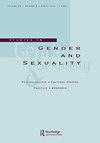(机构)再生产
Q3 Social Sciences
引用次数: 1
摘要
生殖作为一种社会结构在人和制度之间流动。因此,陷入制度暴力循环的人往往可能是他们的同谋,尽管他们没有意图、恶意或指责。在某些方面,我们这些被制度伤害恋物癖、商品化和/或外来化的人不得不陷入制度伤害的循环模式。在这篇文章中,我详细介绍了我自己对这一周期的个人叙述,将记忆工作作为一种模式,通过这种模式来记忆和复述制度再生产是如何对跨性别女性施加压力的。然后,我将自由梦的概念视为一种潜在的想象他人的实践,在其他地方,从此不再有这种复制品。本文章由计算机程序翻译,如有差异,请以英文原文为准。
(Institutional) Re/production
ABSTRACT Reproduction as a social construct moves through people and institutions. As a result, people who are trapped in cycles of institutional violence may oftentimes be complicit in their furtherance, albeit without intent, malice, or blame. In some ways, those of us who are fetishized, commodified, and/or exoticized by institutional harm cannot help but be caught up in cyclical patterns of institutional harm. In this article, I detail my own personal narrative of this cycle, engaging memory work as a mode through which to remember and retell how institutional reproduction presses upon trans women. I then engage notions of freedom dreaming as one potential practice for imagining otherwises, elsewheres, and henceforwards unmarked by such reproductions.
求助全文
通过发布文献求助,成功后即可免费获取论文全文。
去求助
来源期刊

Studies in Gender and Sexuality
Social Sciences-Gender Studies
CiteScore
0.80
自引率
0.00%
发文量
15
期刊介绍:
Beginning in the final two decades of the 20th century, the study of gender and sexuality has been revived from a variety of directions: the traditions of feminist scholarship, postclassical and postmodern psychoanalytic theory, developmental research, and cultural studies have all contributed to renewed fascination with those powerfully formative aspects of subjectivity that fall within the rubric of "gender" and "sexuality." Clinicians, for their part, have returned to gender and sexuality with heightened sensitivity to the role of these constructs in the treatment situation, including the richly variegated ways in which assumptions about gender and sexuality enter into our understandings of "normality" and "pathology."
 求助内容:
求助内容: 应助结果提醒方式:
应助结果提醒方式:


